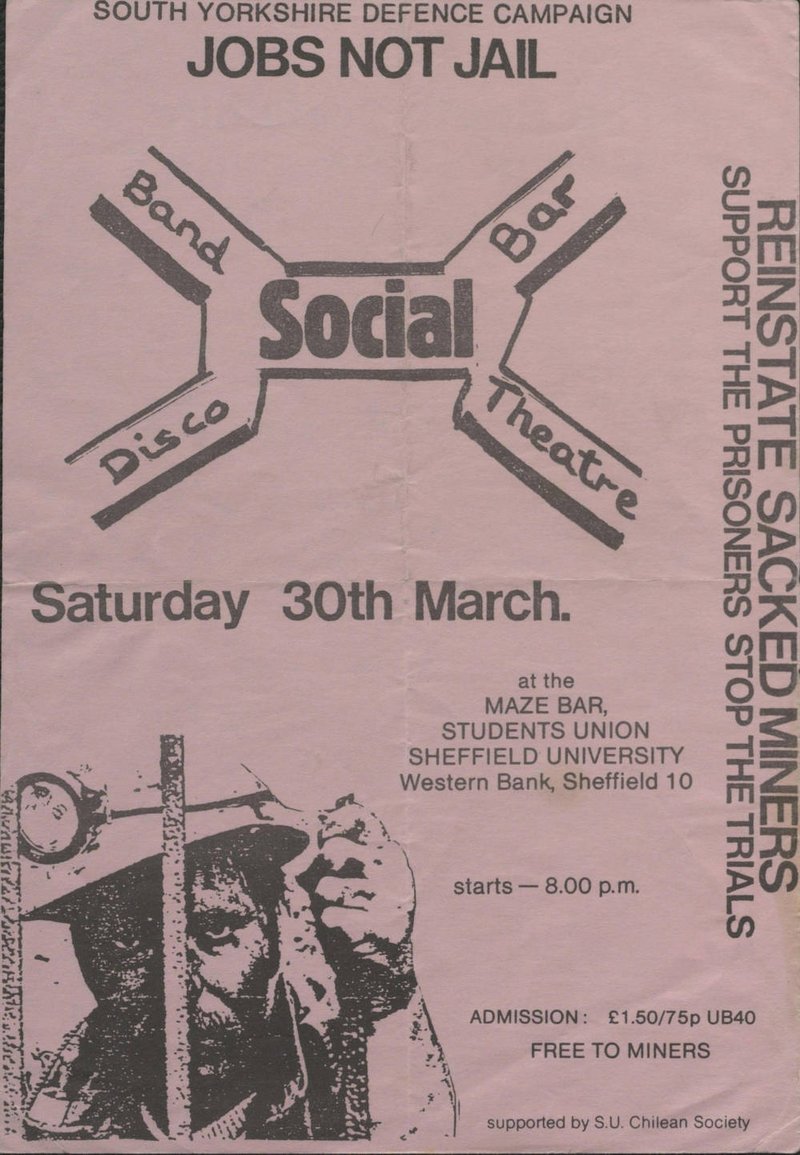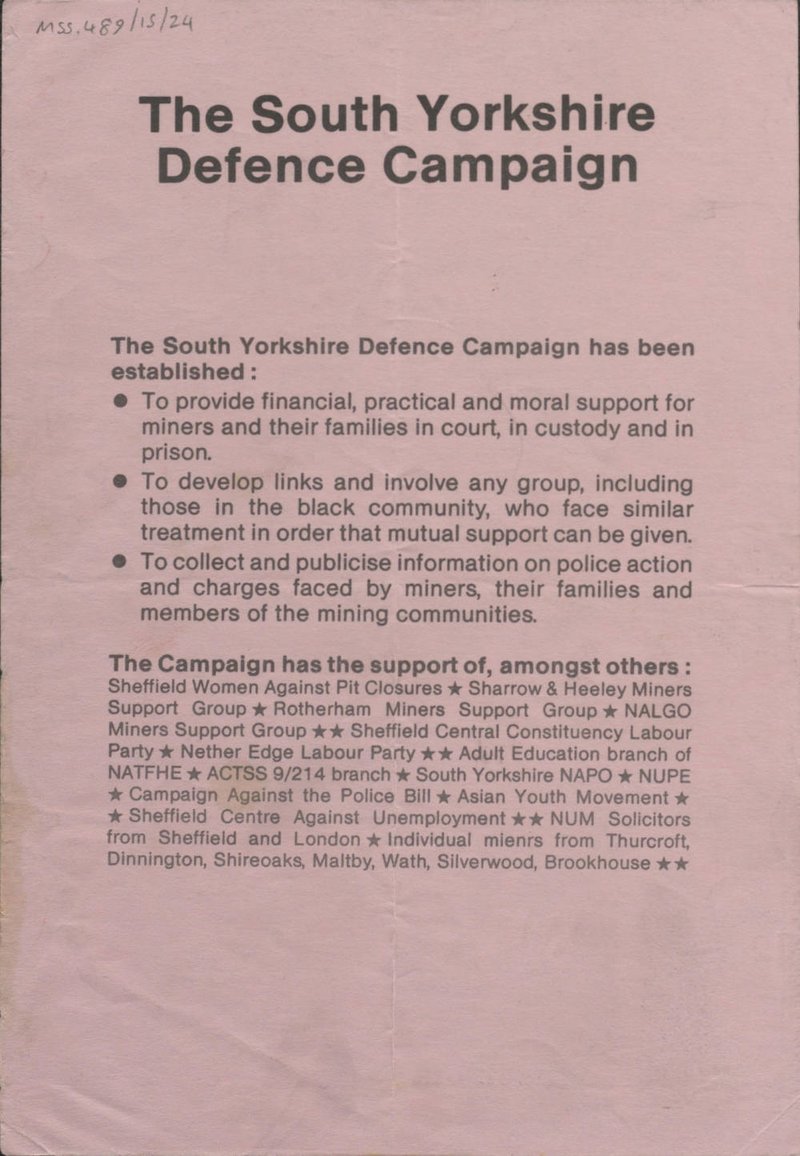
Miners’ Strike
‐
Resistance to the closure of collieries across the UK in 1984–5, supported by activist groups such as the Asian Youth Movement (AYM) and Indian Workers’ Association (IWA)
Place of event
Durham, Kent, Scotland, South Wales, Yorkshire.
About
The miners’ strike of 1984–5 was large-scale industrial action led by the National Union of Mineworkers (NUM) to resist the closure of collieries and attempts to break up the miners’ union by Prime Minister Margaret Thatcher’s Conservative government. On 6 March 1984 the National Board of Coal announced their plans to close twenty pits and cut 20,000 jobs. In response, President of the NUM Arthur Scargill announced a national strike. Communities, particularly women, organized to support strikers by delivering food parcels, setting up appeals and joining strikers on the picket line.
Prior to the miners’ strike, the NUM supported South Asian strikers who were resisting discriminatory work practices and poor working conditions, highlighting solidarities between South Asian activists and miners along political and class lines. During the Grunwick strike, for example, striking women would address factory workers and miners during their speaking tours to galvanize support for their cause. On 23 June 1977 Arthur Scargill and members of the NUM stood on the picket line with the Grunwick strikers, led by Jayaben Desai; he was arrested after violent clashes between picketers and the police.
During the miners’ strike, South Asian activists and workers’ associations supported the strikers in several ways. On 25 April 1984 Avtar Jouhl – National Secretary of the Indian Workers’ Association – spoke at an event titled ‘Policing and the Miners’ Strike’, alongside the Union of Turkish Workers, the Yorkshire NUM and Kent NUM. The event was organized by the East London Rally Against the Police Bill. Similarly, Mukhtar Dar, who was a founding member of the Sheffield Asian Youth Movement (AYM), remembered making early morning house-to-house calls to get other AYM members together to join the picket line at Orgreave. Notably, the Battle of Orgreave on 18 June 1984 was the most violent clash between picketers and the police in Britain’s industrial history. In interviews with Taj Ali and Vanessa Pearce, Dar recalled how, upon their arrival, a miner described the AYM members using a racial slur and asked what they were doing there. Despite the hostility, Dar recognized that there were significant overlapping political issues at stake that required solidarity and collective action. These issues included unemployment, poverty, police violence and the breaking up of industrial unions. In addition, mosques and temples raised funds to financially support the strikers. Dar would visit mosques and temples to share his experiences of being on the picket line and encourage fundraising efforts. He also produced posters in support of the strike, in both English and Urdu. The AYM Coventry produced and distributed 1,000 posters in support of the strike and collected £247 in donations. However, the police threatened to disrupt the renewal of a grant which supported the Coventry Asian Resource Centre – where the AYM operated from – if they did not end the collection, given that they did not receive proper authorization.
By 1985, as strikers faced increasing financial hardship, support for the strike started to wane. On 3 March 1985 the NUM’s national executive voted to return to work, with ninety-eight to ninety-one in favour. The defeat of the strike resulted in the closure of several collieries, increased unemployment and social inequality in mining and working-class communities. Despite the defeat, the miners’ strike cultivated important political and class solidarities between South Asian activists and miners.
Asian Youth Movement, National Union of Miners.
Mukhtar Dar, Arthur Scargill, Margaret Thatcher.
Ali, Taj, ‘Racism and Resistance: How South Asians Fought Back’, Tribune (7 March 2023), https://tribunemag.co.uk/2023/03/how-south-asians-fought-back
Gildea, Robert, Backbone of the Nation: Mining Communities and the Great Strike of 1984–85 (New Haven, CT: Yale University Press, 2023)
Pearce, Vanessa, ‘The British Asians Who Stood with the Striking Miners’, BBC (14 March 2024)
Hildew, Peter, ‘Unions Shrink from Scargill's Mass Picket Call’, Guardian (25 June 1977), p. 2
Coventry Asian Youth Movement, ‘From Chard (Coventry)’, Tandana Archive, Ahmed Iqbal Ullah RACE Centre Collections, Manchester Central Library
East London Rally Against the Police Bill, ‘Policing and the Miners’ Strike’ (25 April 1984), Tandana Archive, Ahmed Iqbal Ullah RACE Centre Collections, Manchester Central Library
Sheffield Asian Youth Movement, ‘Solidarity with the Miners!’, Tandana Archive, Ahmed Iqbal Ullah RACE Centre Collections, Manchester Central Library
Sheffield Asian Youth Movement, ‘Miners ko support karain’, Tandana Archive, Ahmed Iqbal Ullah RACE Centre Collections, Manchester Central Library
MSS.21/1655/208/6, Birmingham Trades Council Women’s Group, ‘Food Donations: Multiple Languages’ (1984–5), University of Warwick Modern Records Centre, Warwick
803/16, Grunwick Remembered: Interview of Pat Thomson by Chris Thomas (2007), University of Warwick Modern Record Centre, Warwick


South Yorkshire Defence Campaign, 'Jobs Not Jail', Papers of Nigel (Nog) Clark, Warwick Modern Records Centre, 1985, MSS.489-15-24_02, no known copyright restrictions. With permission of the Warwick Modern Records Centre.
Image credit
© Remaking Britain: South Asian Connections and Networks, 1930s – present
